Tresfjord Church
Tresfjord Church (Norwegian: Tresfjord kyrkje) is a parish church of the Church of Norway in Vestnes Municipality in Møre og Romsdal county, Norway. It is located in the village of Tresfjord. It is the church for the Tresfjord parish which is part of the Indre Romsdal prosti (deanery) in the Diocese of Møre. The white, wooden church was built in an octagonal style in 1828 by the architect and master builder Erik Kroken. The church seats about 220 people.[1][2][3]
| Tresfjord Church | |
|---|---|
| Tresfjord kyrkje | |
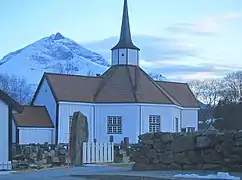 View of the church | |
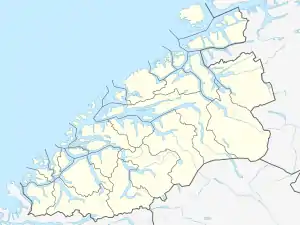 Tresfjord Church Location of the church 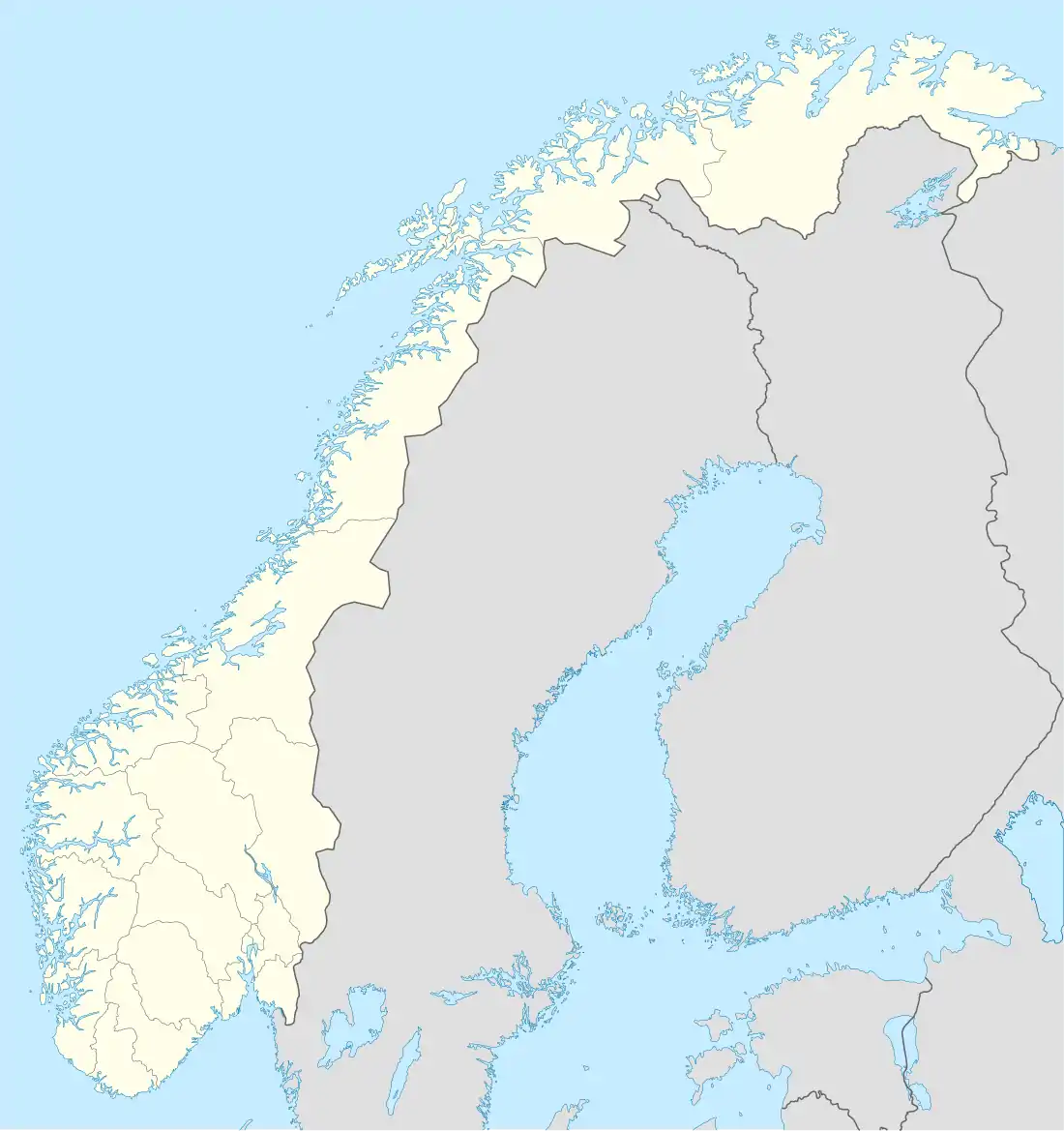 Tresfjord Church Tresfjord Church (Norway) | |
| 62.5249°N 7.1258°E | |
| Location | Vestnes Municipality, Møre og Romsdal |
| Country | Norway |
| Denomination | Church of Norway |
| Churchmanship | Evangelical Lutheran |
| History | |
| Status | Parish church |
| Architecture | |
| Functional status | Active |
| Architect(s) | Erik Kroken |
| Architectural type | Octagonal |
| Completed | 1828 |
| Specifications | |
| Capacity | 220 |
| Materials | Wood |
| Administration | |
| Parish | Tresfjord |
| Deanery | Indre Romsdal prosti |
| Diocese | Møre |
The building is a log construction. The octagonal shape typical for the area is elongated with sacristy and "armory" (vestibule) added to main octagonal body. The church was renovated by Domenico Erdmann in 1927-1929. In the 1970s, wires were installed to support and straighten the building.[4] After substantial repairs in 2006 the structure is now stable without supporting wires.
The King and Queen of Norway visited the church in 2003.[5]
History
The earliest existing historical records of the church date back to 1589 when it was called Sulta kirkje. This old stave church was mentioned in Trondhjems reformats 1589 (a record of churches and ecclesiastical goods in central and northern Norway) and it was considered to be an annex chapel to the Old Veøy Church. Archival sources suggest that there were two churches in 1600 at Sylte in Tresfjord, one newer building and one old and decaying (which was later torn down).[6]
In 1690, a new cruciform wooden church was constructed west of the present building. The tower was relatively tall and centrally located. The walls of this 1690 church were covered in weatherboards. Materials from the 1690 building were reused and some is said to exist in farm buildings in the area. Window glass from 1634 used in the sacristy of the older church, was used in a residential building but is now kept at the museum in Trondheim. The pulpit and some other furniture from the previous church were reused in the present church.[6][4]
The church and adjacent properties were sold by the King in 1721 and it was bought by 84 farmers from the Tresfjord area.[4]
In 1825, the church was 135 years old and in poor shape, so the people decided to tear it down and rebuild a new church. Farmers that supplied timber for the new building were able to obtained part ownership in the church. Substantial construction work was volunteer and unpaid. The new church was completed in 1828.[6][4]
Tresfjord Municipality bought the church in 1902 from the local farmers and made the church public property.
Interior
The altar frontal above the pulpit dates from the early 14th century. It is an oil painting measuring 92 by 135 centimetres (36 in × 53 in). About 30 such medieval frontals exist in Norway, this is the only one not in a museum. The altar frontal is made from pine boards, and the cracks between boards are covered with parchment. There is old Norse writings on the parchment which shows that altar frontal was made in Norway. There was also an old carpet, probably an antependium, made from woven wool and linen, this carpet is now kept at Norwegian Museum of Cultural History.[4]
The pulpit is in Renaissance style and was crafted by a local blacksmith in 1687 for the previous church.[4]
The first organ was installed in 1921, previously hymns were sung without instrumental accompaniment. Clocks in the tower are from the 19th century.[4]
Domenico Erdman[4]
Farms with ownership in the church had reserved seats with names painted on the small doors to each row of seats. Women were seated to the left, men to the right where there are still pegs for the men's hats.[4]
Along the upper part of the wall around the entire nave there is a wide field of rosemaling. Four painted pillars (staves) support the roof. The rafters are decorated with green vines. The ceiling is decorated with blue stars. The interior was restored in 1928 and in 1968 (after leakage). There are five large paintings with biblical motives. Above the chancel there is a large painted rose with the Hebrew word Jehova. The balcony is decorated with Carl XIV Johan’s monogram between two lions.[4]
The interior includes a crucifix, an angel, and eucharist figures from an older church (possibly the 1690 church building). There is also a 1738 copy of the Bible. A collection box for donations to the poor needs two keys to open. The baptismal font originate from the previous church.[4]
Media gallery
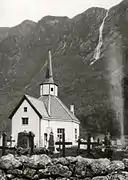
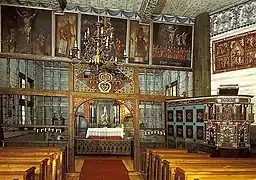 Interior.
Interior.
Credit: kirkenorge.no

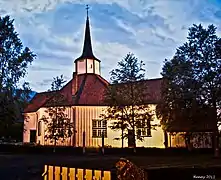
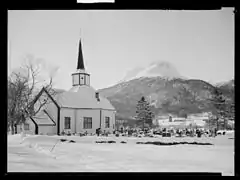
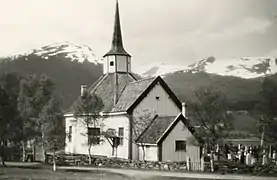
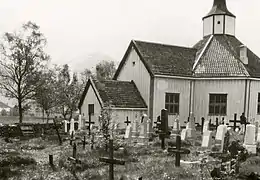
References
- "Tresfjord kyrkje". Kirkesøk: Kirkebyggdatabasen. Retrieved 2019-07-13.
- "Oversikt over Nåværende Kirker" (in Norwegian). KirkeKonsulenten.no. Retrieved 2019-07-13.
- "Kyrkjene i Vestnes" (in Norwegian). Vestnes kommune. Retrieved 2013-06-06.
- Eidhamar, Kristine; Skeidsvoll, Tale (1978). Tresfjord kyrkje 1828-1978 (in Norwegian). Tresfjord sokn.
- "Program for kongebesøket". NRK Møre og Romsdal (in Norwegian). 2003-06-11.
- "Tresfjord kyrkjestad" (in Norwegian). Norwegian Directorate for Cultural Heritage. Retrieved 2019-07-13.
External links
- Tresfjord Church on kunsthistorie.com (History of Art wiki, in Norwegian), more photos.
| Wikimedia Commons has media related to Tresfjord Church. |